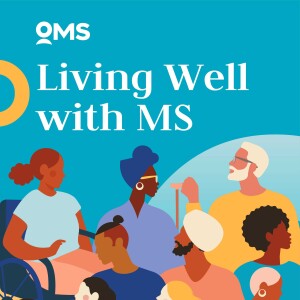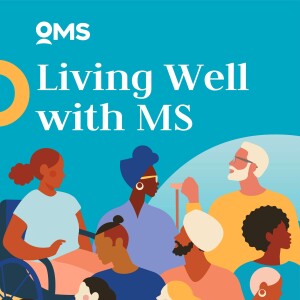
Living Well with Multiple Sclerosis
Health & Fitness:Fitness

Welcome to Living Well with MS, where we are pleased to welcome Dr Michael Greger as our guest! Dr Greger is a physician, New York Times bestselling author, and internationally recognised speaker on nutrition, food safety, and public health issues. He speaks to Geoff about gluten and MS, how to get enough iron from food and how to ensure you don’t get a leaky gut.
Keep reading for the key episode takeaways and Dr Greger’s bio.
Make sure you sign up to our newsletter to hear our latest tips and news about living a full and happy life with MS. And if you’re new to Overcoming MS, visit our introductory page to find out more about how we support people with MS.
Selected Key Takeaways:Fibre from whole intact grains and legumes will decrease intestinal permeability AKA “Leaky Gut”
The most important thing to decrease intestinal permeability or [to] seal up a leaky gut is [to get enough] short-chain fatty acids that our body makes from fibre and resistance starch. These prebiotics that we eat are turned by our good gut bacteria into what are called ‘post-biotics’. What are the most concentrated sources of fibre in the diet? Number one, whole intact grains and legumes including beans, split peas, chickpeas and lentils are the most important sources of fibre.
There are many health benefits to eating ground flaxseeds
I'd rather people get their flaxseed oil within their flaxseeds, so from ground flaxseed (that's part of my daily dozen). Just because, in addition to getting the short-chain Omega-3 alpha-linolenic acid in those flax seeds that are found in the oil, you also get a nice low soluble fibre [and] most importantly the lignans which are cancer-fighting compounds which are not found in oil.
Vitamin C improves the absorption of plant-based iron sources
To get enough iron from plant-based sources, you combine sources of iron like legumes and whole grains with Vitamin C-rich foods. Vitamin C actually improves the absorption of plant-based iron. Vitamin C-rich foods [are foods such as] citrus, tropical fruits, broccoli [and] bell peppers. You just want to have it all in your stomach at the same time and that will improve your absorption.
- Visit Dr Michael Greger’s website
- Find out about Nathan Pritikin (an early pioneer in lifestyle medicine)
- Listen to S4E53 Ask Jack on the topic of sodium
- New to Overcoming MS? Visit our introductory page
- Connect with others following Overcoming MS on the Live well Hub
- Visit the Overcoming MS website
- YouTube
Subscribe to this podcast and never miss an episode. Listen to our archive of Living Well with MS episodes here. If you like Living Well with MS, please leave a 5-star review.
Feel free to share your comments and suggestions for future guests and episode topics by emailing podcast@overcomingms.org.
Make sure you sign up to our newsletter to hear our latest tips and news about living a full and happy life with MS.
Support us:If you enjoy this podcast and want to support the ongoing work of Overcoming MS, we would really appreciate it if you could leave a donation here. Every donation, however small, helps us to share the podcast with more people on how to live well with MS.
Dr Michael Greger’s bio:A founding member and Fellow of the American College of Lifestyle Medicine, Michael Greger, M.D., is a physician and internationally recognised speaker on nutrition. He is a graduate of Cornell University School of Agriculture and Tufts University School of Medicine.
Dr Greger’s career
His science-based nonprofit, NutritionFacts.org, offers a free online portal hosting more than 2,000 videos and articles on myriad health topics.
Dr Greger is a sought-after lecturer and has presented at the Conference on World Affairs and the World Bank, testified before Congress, and was invited as an expert witness in Oprah Winfrey’s defence in the infamous “meat defamation” trial.
Dr Greger’s books
Dr Greger is also an acclaimed author. How Not to Die, The How Not to Die Cookbook, and How Not to Diet became instant New York Times Best Sellers. More than a million copies of How Not to Die have been sold. All proceeds Dr Greger receives from the sales of his books and speaking honoraria are donated directly to charity.
More Episodes
 2024-10-02
2024-10-02
 1.1k
1.1k
 2024-07-24
2024-07-24
 136
136
 2024-05-29
2024-05-29
 80
80
 2024-05-01
2024-05-01
 112
112
 2024-02-07
2024-02-07
 62
62
Create your
podcast in
minutes
- Full-featured podcast site
- Unlimited storage and bandwidth
- Comprehensive podcast stats
- Distribute to Apple Podcasts, Spotify, and more
- Make money with your podcast
It is Free
- Privacy Policy
- Cookie Policy
- Terms of Use
- Consent Preferences
- Copyright © 2015-2024 Podbean.com





